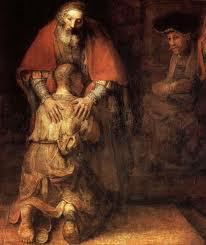There are wondrous moments in life that we all experience a sense of joy; falling in love – celebrating a marriage – the birth of a child; each of us have experiences where we have felt a tremendous sense of joy; and yet,each of these is only a small taste of what God holds out for each of us.
Joy is irrepressible; it can’t be contained. It’s not like pleasure in an activity, or satisfaction at accomplishing something; when we experience joy, we can’t hide it – we feel compelled or drawn to let it out; to share it with everyone and anyone we come in contact with. Joy is contagious; and it can even conquer fear.
Today we mark the most incredible cause of joy in the entire history of the human race – the Resurrection of Our Lord Jesus Christ from the dead. We celebrate and join with the members of the Church around the world, with the angels and the saints in heaven, in rejoicing at the Truth of God.
This is the day that all of creation was waiting for; when in the fullness of time, through the power of the Risen Christ we become what we were meant to be from the beginning of time; reunited with God for all eternity.
Sometimes we think the people of the past, who weren’t as technologically advanced as we are, were somehow naïve, or unintelligent.
In our more recent history, I don’t think any of us would consider those who grew up without the internet to be of lesser intelligence than those who have known the ‘web’ for the better part of their lives. And long before cellphones, before television and radio, people knew and understood the realities of life and relationship; sometimes I think far better than our culture does today.
The people of first century Palestine, in Jesus’ day, were not stupid. They knew the realities of human existence; of struggles and success, of conflict and peace, of work and rest, and of life and death. Their experience and knowledge taught them that people don’t die and then just come back.
But following that first Easter, that is exactly what the disciples were proclaiming. Jesus had died and had risen! It was the message that spread throughout the known world, and people believed; many to the point of giving their very lives in defense of this Good News, the Gospel. It was the message that through Christ, sin and death were defeated, and the promise of eternal life, being reunited with God as we were all meant to be, was given to all who believed.
Those who heard and accepted the Gospel message did so because of the witness of believers; because of the ‘light of Christ’ which was shining from them and the faith they were granted by God through the working of the Holy Spirit.
It’s interesting to note that while each of the four Gospels contains different insights into the teaching and works and actions of Jesus during his lifetime on earth, there are only a couple of episodes that are recorded in all four; they all record the passion, death and Resurrection of Jesus- and they all record how St. Mary Magdalene was the first witness to the Truth of the Resurrection; and even though she first met this truth with fear, that fear would give way to joy; she in turn would be the one to take this joyful news and share it with the Apostles; despite all of the turmoil and sorrow and horror that all of Jesus friends and followers and family experienced in the several days leading up to this, here was the message of indescribable joy that simply could not be contained.
He is Risen!
The authorities in Jerusalem could not defeat God’s plan; the power of the Roman Empire could not defeat God’s plan; even today, a world and culture that seems bent on self-absorption and self-destruction and relegating the Church to the fringes of society, cannot defeat God’s plan. The light of Christ remains. The Church remains.
In some way, at some time each of us here has been called by God to return to Him; directly or indirectly – perhaps by angels as the message of Christ’s resurrection is told to St. Mary Magdalene; perhaps through others’ words and actions, as St. Mary Magdalene was instructed to tell the news of the resurrection to the other disciples; perhaps by a whisper from God Himself in the very depths of our hearts, whether we recognized it at the time or not.
But God has called each of us into this victory;
– it is this newness, this fresh beginning, this rebirth that we are all called into, beginning with baptism and entering into the tomb with Christ we join in His Resurrection; in our own faith journeys; no matter how often we fall short, the victory of the Resurrection is held out for us over, and over and over; and when we really take the time to consider that, how could we not be filled with joy? How could we not want to share that with others through our own witness to the goodness of God in our lives or the promise of eternity with God because of Christ’s rising from the dead? How could we not want to share in the sacramental life of the Church?
During our continuing journey in faith, each of us faces challenges and struggles; but God continually calls us and gives us the help we need to rise above those challenges and open our hearts to this great gift of Himself – His life- that He so desires to give continually to each of us.
That’s love; it’s a love which gives us hope; that is a hope that fills us with joy.
There is always time to consider the trials and tragedies and difficulties of our life on earth. There is time to consider the struggles the Church faces in the world. But this is not the time to reflect on those.
This is a time to celebrate; this is a time for great joy and happiness and gratitude.
This is Easter Sunday: this is the Day that the Lord Has Made.
Let us Rejoice and be glad!







